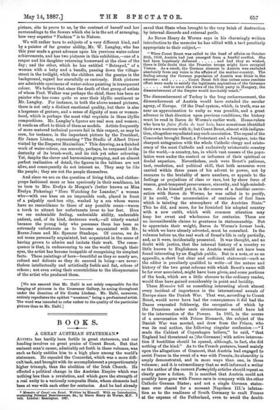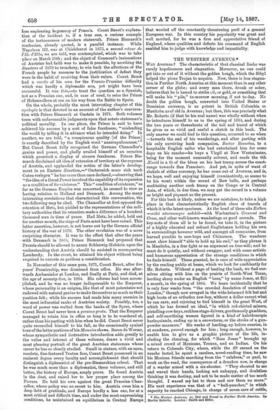BOOKS.
A GREAT AUSTRIAN STATESMAN" Annals. has hardly been fertile in great statesmen, and our heading involves no great praise of Count Benet. But that eminent man's career, admirably set forth in these volumes, was such as fairly entitles him to a high place among the world's statesmen. He repealed the Concordat, which was a more diffi- cult task, and brought with its accomplishment a proportionately higher triumph, than the abolition of the Irish Church. He effected a political change in the Austrian Empire which was nothing less than a revolution, and which gave the strength of a real unity to a variously composite State, whose elements had been at war with each other for centuries. And he had already
• Memoirs of Coma sea Boost. Written by Himself. With an Introduction, containing Personal Reminiscences, dn. by Baron Henry de Worms, M.P. vols. London: Remington. 1887.
saved that State when brought to the very brink of destruction by internal discords and external perils.
As Baron Henry de Worms says in his charmingly written introduction to the memoirs he has edited with a tact peculiarly appropriate to their subject,—
"When Count Benet was called to the bead of affairs on October 80th, 1866, Austria bad just emerged from a fearful conflict. She had been hopelessly defeated and had they so wished, there is little doubt that the Prussian troops might have occupied Vienna. As a result, the German element in Austria was excluded absolutely from any voice in the affairs of the mother-country. The feeling among the German population of Austria was bitter in the
extreme and Count Beast felt that unless some resolute effort were made to satisfy the legitimate aspirations of the Germans
and to meet the views of the Heat party in Hungary, the dismemberment of the Empire would inevitably result."
The dismemberment of Turkey is the long embarrassment, the dismemberment of Austria would have entailed the secular agony, of Europe. Of the Dual system, which, in truth, was as near an approximation to unity as was possible, and a great advance in that direction upon previous conditions, the history must be read in Baron de Worms's earlier work. Home-rulers who love to faire jleche de tout bole, have sometimes identified their own nostrum with it; but Count Benet, almost with indigna- tion, altogether repudiated any such association. The repeal of the Concordat brought Beast, a Protestant and a foreigner, into the sharpest antagonism with the whole Catholic clergy and aristo- cracy of the most Catholic and exclusively aristocratic country in the world,—a country, too, in which vast masses of the popu- lation were under the control or influence of their spiritual or feudal superiors. Nevertheless, such were Benst's patience, tact, resolution, and political skill, that both measures were carried within three years of his advent to power, not by recourse to the brutality of mere numbers, or appeals to the feelings or prejudices of class or race, but by sheer force of reason, good-tempered perseverance, sincerity, and high-minded- ness. As he himself put it, in the course of a familiar conver- sation with Baron de Worms, he was called in to purify, if he could, "the accumulation of centuries of foul linen which is tainting the atmosphere of the Austrian State." This he did, and more, for he furnished his adopted country with a new outfit, which with common attention may keep her sweet and wholesome for centuries. These are no inconsiderable claims to greatness in statesmanship. But to appreciate their weight, Baron de Worms'e former book, to which we have already adverted, must be consulted. In the volumes before us, the real work of Beast's life is only partially, and, as it were, incidentally presented. It was thought, and no doubt with justice, that the internal history of a country so little known to Englishmen as Austria would not have been found interesting by an English public. But in a note, or as an appendix, a short but clear and sufficient statement—such as the editor is peculiarly qualified to write—of the nature and history of the two great reforms with which Beust's name will be for ever associated, might have been given, and some portions of the book, which are a little obscure to the ordinary reader, would thus have gained considerably in point and lucidity.
These Memoirs tell us something interesting about almost every incident of importance in the international annals of Europe since the Danish War. That war, according to Count Benet, would never have had the consequences it did had the Danes evacuated Schleewig, the occupation of which by the Prussians under such circumstances would have led to the intervention of the Powers. In 1865, in the course of a conversation with Prince Bismarck, the subject of the Danish War was mooted, and drew from the Prince, who was its real author, the following singular confession :—" I made the Cabinet of Copenhagen believe," he said, "that England had threatened us [the Germans] with active interven- tion if hostilities should be opened, although, in fact, she did nothing of the kind." As to the French pretence, based mainly upon the allegations of Gramont, that Austria had engaged to assist France in the event of a war with Prussia, its absurdity is amply demonstrated, and in more ways than one, in these volumes ; and it is extraordinary that so well-informed a writer as the author of the current Fortnightly articles should repeat so clearly gross a fiction. It is manifest that Austria could not possibly have gone with France save in company with the other Catholic German States ; and not a single German states- man ever shared for a moment Napoleon III.'s infatua- tion as to the readiness of South Germany to exalt France at the expense of the Fatherland, even to avoid the doubt-
less unpleasing hegemony of Pruss:a. Count Beust's explana- tion of the incident is, if a true one, a curious example of the tortuousness of modern statecraft. Prince Bismarck's confession, already quoted, is a parallel instance. While Napoleon IIL was at Chislehurat in 1873, a second rdour de Vile d'Elbe, we are told, was contemplated, which was to take place on March 20th; and the object of Gramont's insinuations of Austrian bad faith was to make it possible, by ascribing the disasters of 1870 to treachery, to win back the affections of the French people by recourse to the justification of defeat they were in the habit of receiving from their rulers. Count Beast bad a melte of his own for the Franco-Prussian difficulty which was hardly a diplomatic one, yet might have been successful. It was this,—to treat the question as a Spanish, not as a Prussian one, and, in case of need, to seize the Prince of Hohenzollern at sea on his way from the Baltic to Spain.
On the whole, probably the most interesting chapter of this apologia is that devoted to an account of the author's conversa- tion with Prince Bismarck at Gastein in 1871. Both volumes teem with unfavourable judgments upon that astute statesman's political morality. In one place, the Prince is said to have achieved his success by a sort of false frankness, "misleading the world by telling it in advance what he intended doing." In another, we are told, "a conspicuous quality [of the Prince] is exactly described by the English word unscrupulousness.' " But Count Benet fully recognised the German Chancellor's genius and power, and gladly availed himself of an occasion which promised a display of sincere frankness. Prince Bis- marck disclaimed all idea of extension of territory at the expense of Austria, and applauded the notion of the latter's develop- ment in an Eastern direction,—" Oesterreich muss sich nach Oaten verlegen " he has more than once declared,—observing that "the idea of a Great Power involved the capability of its expansion as a condition of its existence." This" condition of existence," as far as the German Empire was concerned, he seemed to view as having relation to Holland and Denmark. Among the many interesting revelations that characterised this conversation, the two following may be cited. The Chancellor at first opposed the retention of Metz, but yielded to the representations of the mili- tary authorities that its retention made a difference of a hundred -thousand men in time of peace. Had Metz, he added, held out for another month, the siege of Paris must have been raised. This latter assertion, however, is not borne out by the German official history of the war of 1870. The other revelation was of a more surprising character. It was to the effect that after the peace
• with Denmark in 1861, Prince Bismarck had proposed that Prussia should be allowed to annex Schleswig-Holstein upon the understanding that Austria should be assisted in reconquering Lombardy. In the event, he attained his object without being required to execute so perilous a consideration.
In November of this same year, 1871, Count Beast, after five years' Premiership, was dismissed from office. He was after- wards Ambasiador at London, and finally at Paris, and died, at the age of seventy-five, in 1884. His reforms had been accom- plished, and he was no longer indispensable to the Emperor, whose personality is an enigma, like that of most potentates not endowed with natural genius to make themselves as much as their position felt ; while his success had made him many enemies in the most influential ranks of Austrian society. Possibly, too, a word of power was wafted from the banks of the Spree, where Count Beast had never been a persona grata. That the Emperor managed to retain him in office so long is to be wondered at, rather than his parting with him when he did. Count Beast never quite reconciled himself to his fall, as the occasionally cynical -tone of the latter portions of his Memoirs shows. Baron de Worms, whose sympathetic and instructive introduction adds greatly to the value and interest of these volumes, draws a vivid and most pleasing portrait of the great Austrian statesman whose career he has so closely studied. Small in stature, with an open, resolute, fine-featured Teuton face, Count Beast possessed in an eminent degree every faculty and accomplishment that should distinguish a diplomatist of the pre-Bismarckian school. That he was much more than a diplomatist, these volumes, and still better, the history of Europe, amply prove. He found Austria in the dust, and raised her to her proper place among the Powers. He held his own against the great Prussian Chan- cellor, whose policy was no secret to him. Austria owes him a deep debt of gratitude, and Europe hardly a less one, for at a moat critical and difficult time, and under the most unpromising conditions, he maintained an equilibrium in Central Europe
that warded off the constantly threatening peril of a general European war. In this country his popularity was great and well merited, for he was a firm and appreciative friend of England, whose qualities and defects his command of English enabled him to judge with knowledge and impartiality.



































 Previous page
Previous page